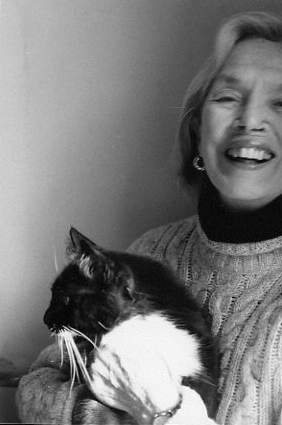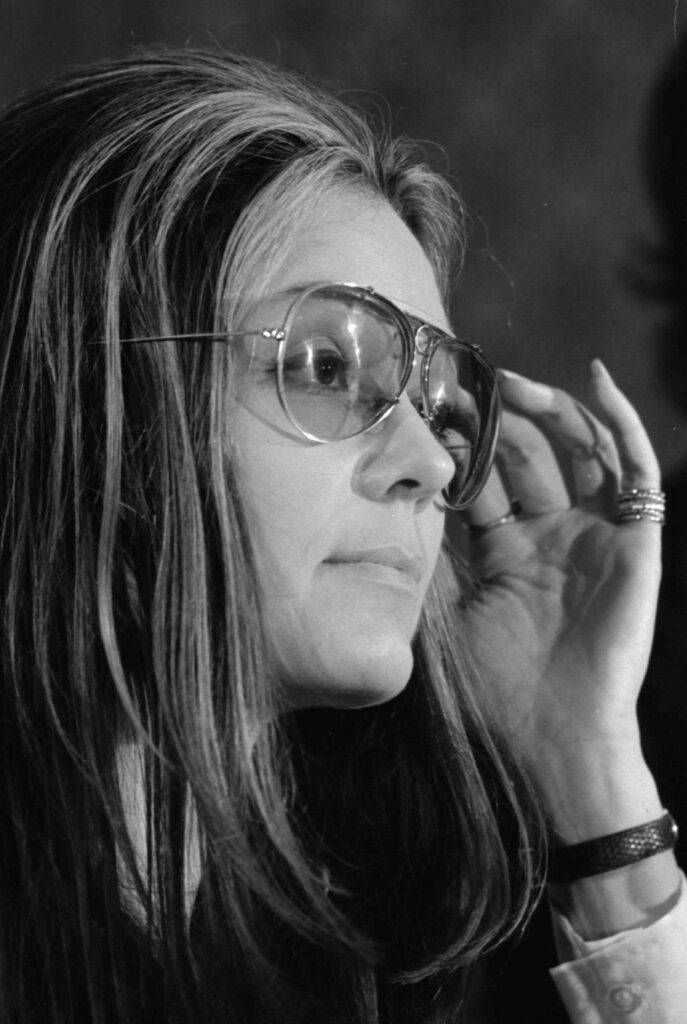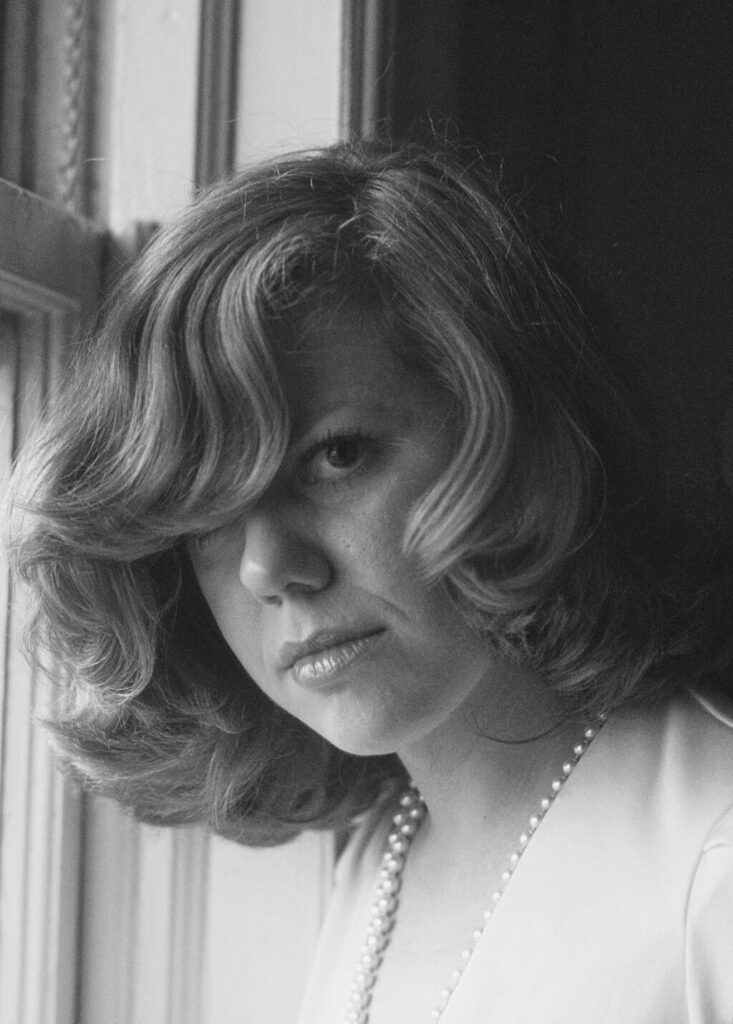By Alexis Reynolds, ’27 English, Digital Initiatives Assistant
“What’s that? Say again!”
We’ve all been there. A lot of us probably say these four words on a constant basis. I know I do, which is why I was a bit hesitant about beginning to work on the Don Swaim Collection audio transcription project. Swaim is an Ohio University alumnus, who created his own radio broadcast in New York called Book Beat, in which he interviewed many famous authors. The segments that were syndicated nationally on CBS were only about two to five minutes, but Swaim had 20-to-30-minute conversations with his interviewees that never aired. My job was making sure that the original transcriptions of the longer interviews were correct. In other words, I had to listen very, VERY carefully, and at times increase the volume of my headphones to full blast.
Despite my hesitance, I came to love the interviews and the content they covered. What especially piqued my interest were the many interviews that Swaim had with female authors, and even more interesting was the fact that these authors were either coming out of, had witnessed, or grown up in, the women’s movement of the 1960s and 70s. I myself had just been delving deeper into the movement in my Women’s Gender and Sexuality Studies course here at Ohio University. So, you can imagine my surprise, and excitement, when what I was learning in class made its way outside the walls of Bentley 233, and into my ears at work.
Along with discussions about the feminist movements and the trials of being a female author in the publishing industry, I as an English Literature major and total booklover, was completely geeking out over the many different processes that each author had when it came to her writing. The insights and advice that some of these women provided was eye-opening. Hearing these women talk about their own struggles and successes has been very inspiring for me, and hopefully their words of wisdom will be for others as well.
March is Women’s History Month when all women of past, present, and future are celebrated and remembered, which is why I thought it fitting to bring this project to the public’s attention. So, without further ado, and in honor of Women’s History Month, I’d like to introduce you to the women of ink, pen, and paper.
Alice Adams
My first experience with the Swaim interviews was the transcription of the Alice Adams interview. Adams is the author of Superior Women and several other works. As with all his interviews Swaim gets to know the life of his guest and then begins to explore their literary processes and methods of writing. Outside of Alice Adam’s past and writing technique, the interview crosses a multitude of different topics. These topics ranged from the instability of the publishing industry to the drinking habits of writers, and eventually to the feminist movement and subsequent feminism within (or not within) Adams’s novels. It was these topics that, while I was already actively listening, made my ears perk up even more, and which opened the door for me into the minds of these brilliant authors.

I noticed small things at first. Swaim had asked Adams what her early writing topics as a child were and as she began to list what she implied were typical subjects to write about like “sunsets” and “landscapes” Swaim then suggested “boys?”. Now, admittedly Adams agreed that she had indeed written about boys, but in the back of my head I found myself asking “Is that the only subject a woman or young girl is inclined to write about? Boys?”. Nevertheless, I disregarded the question and continued to listen. Then it happened.
Swaim referred to a comment made by another one of his interviewees regarding the large amount of feminist writing that was being “unkind to men.” He then proceeded to state when speaking to Adams, “there are many feminist writers, I don’t certainly include you in that category” as though being a feminist was a bad thing. I stopped the recording, stood up and took a break. After a minute or two, I came back to hear Swaim cut off by Adams saying, “I am a feminist.” I wanted to jump for joy and say, “You go girl!”. Adams then proceeded to agree that feminist writing was indeed being “mean to men” with a “let’s get them” attitude. I did not expect someone who just identified themself as a feminist to sympathize with and agree that men were having a tough time in the literary world at the hands of women. However, this discovery prompted me to reflect a bit on my own definition of what it meant to be a feminist, and how to portray that identity in the positive way it should be instead of the negative way in which it sometimes is viewed.
I did not immediately realize it then during this interview, but I would soon come to learn that the feminist movement was not a single bodied mass with the same desires and goals. It was as complex and ideologically diverse as any other organization that large and that freshly formed would be.
Marge Piercy
My next interview review was that of Marge Piercy, the author of numerous novels such as Vida, Small Changes, and Fly Away Home, just to name a few. In addition to all the amazing facets about her life, writing style, and publishing experience, the interview, as one would expect, delves into some of the content within her novels, some of which involve feminism. In addition to her discussion of feminism, it was also the remarks she made about her writing that drew my attention.
Piercy discusses the social connotations surrounding the word “feminist” that are still at play in 2024. She explains her fascination with one of her two characters who does not identify as a feminist while her sister in the novel does. Piercy explains that this character represents what she believed many women felt back then (and which I believe is still accurate today). She tells Swaim, “And constantly I meet women who will say, ‘Yes, I believe in equal pay for equal work. Yes, of course I work. Yes, I want my daughters to have lives in which they have a lot of choices and a lot of autonomy. But, no, I’m not a feminist,’” because, she says, “feminist is a bad word.” I immediately agreed with Piercy on this viewpoint because it even impacted the writing of this article, meaning I needed to decide whether using the word “feminist” was a smart choice or if the negativity surrounding it would drive readers away. Piercy’s remarks on feminism, and the positive or negative associations surrounding it, are what I found so intriguing about her interview because they are still extremely relevant today.
It was also during this interview that the English major in me came roaring to life. At one point Swaim began to ask Piercy about her writing process and style, and it was then that Piercy made the comment that, “My writing is not my baby.” Swaim pointed out that what she said is not what many other writers would typically admit or believe. I agreed with Swaim. Anything I write becomes my child. Like a child, my writing frustrates me, makes me laugh, and brings me joy, but I love it anyway. In view of this description, Piercy’s perspective becomes one of interesting note. What I write, or what an author writes, in Piercy’s perspective as she explained later, is not ours anymore once we give it up for people to read. They take what they will and give it different meanings than what we intend or want which I thought was very wise, and which I admire her for speaking aloud because so many authors don’t want to admit that.
Gloria Steinem
In all honesty, I don’t think this next person needs an introduction, but while she is known for her role in feminist activism, we must not forget that Gloria Steinem was a writer as well (and that she is an Ohioan).

Given all the feminist talk I had been listening to previously, I jumped at the chance to review Steinem’s interview. Naturally, feminism was discussed, but it was Swaim’s comments and questions that I found most intriguing. When Steinem expressed that she hoped people viewed her as a feminist writer Swaim countered with the question “Why couldn’t a writer be as eclectic as possible and write not only about feminism, but all other aspects of people’s lives?” To which Steinem responded that people can. She then proceeded to say, “…being a feminist means you see the world whole instead of half.” Given previous comments made by Piercy surrounding the word feminist, I felt that Steinem was answering the dilemma Piercy voiced. It was mind-blowing, and even a bit surreal.
However, it was what Swaim did throughout the whole interview that got my attention and influenced my appreciation towards him. He did not make the whole interview about feminism and politics. As he put it, “[He’d] been focusing on Gloria Steinem the writer and not the activist, because writing is something that [he deals] with in [his] series” which I have a great amount of respect for. I think it is important to remember that people like Steinem are humans too, and they have other interests, hobbies, and believe it or not…lives! Steinem even mentioned that she’d like to take a step back from traveling and cameras to write more. While most of Steinem’s life has been characterized by her activism, I think it is important to remember her as a person (and writer) too.
Mary Lee Settle
Mary Lee Settle is the author of several works, most notably her O Beulah Land series. She won many awards such as the National Book Award and was founder of the PEN Faulkner Award, which she mentions and discusses in great detail during the interview.
When I heard Mary Lee Settle speak for the first time, I got the impression that she did not let anyone tell her what to do… and I was right. She was sassy, witty, and very intelligent. There were a few moments when I had to let a little chuckle slip out, and even though the topic of feminism was not discussed I found this interview to be one of the most interesting and lively of the ones I have completed already. Settle, as Swaim described her, was “not one to pull any punches” and after listening to the interview I fully agree with him.
What amazed me about Settle is that she was not afraid to call people out, even the very people who awarded her. In her eyes, awarding literary writing had to be done by people who were going to put in the effort and who cared about the books and poems they were judging. When I heard Settle talk about these qualities and about her disapproval of the National Book Award, I began to see writing in a way that I hadn’t before.
Constantly, when I write I do so for acknowledgement and validation. In other words, I want someone to tell me what I wrote was good. That it was worthy (of what, I have no idea). That my creation, my art, my craft was important. In fact, as I write this post, I am certain I will be hoping someone tells me what a good job I did. With that said, I think that Settle’s view of the NBA (no, not that one) can be interpreted in a way that addresses my, and what I assume are many other writers’, need for validation. I think Settle would appreciate me putting it this way, “It’s our writing, and it’s good if we say it’s good.” We may be going back on taking Piercy’s advice a little bit right now, but different situations call for different sets of advice.
Speaking of advice, Settle also gave more direct tips for writing in the interview. Like many of the other authors I have written about in this post, Settle taught writing as well. When asked by Swaim what advice she would give writers today she told him what she used to say to her students, “Write about what you don’t know, and maybe you’ll find out you know a lot more than you thought you did.” Again, I was dumbfounded. It was something so simple, but I can tell you, if I were to go back through all my other past writings, I would find a pattern of things (genres, styles, even fonts) I was comfortable writing in. Like most advice, it’s easier said than done, and there is no difference here. However, it’s all about taking the first step, and if these women can face a world that keeps shoving them down and still get back up again, I think I can try to write a little out of my comfort zone.
Content warning: This interview contains violent language.
Erica Jong
Erica Jong is the author of several works such as Fear of Flying and Parachutes and Kisses. Her interview with Swaim was a very interesting one to listen to partly due to the topic. I’ll just say it now. They talk about sex. Though I haven’t had time to read them, Jong’s books apparently included explicit sexual content for her time. As one would assume, this topic did come up in the interview and led into, you guessed it, the second-wave feminist movement with a hint of female sexuality squeezed in.
When discussing the content of her novels, Swaim claimed that it doesn’t matter what gender the author is, because authors can “get into the skin of either sex and write from the perspective of either sex without being that sex.” My first reaction to this claim was one of support. After all, Swaim was basically advocating that all authors had the same and equal skill, but it was what Jong said next that altered my thoughts a bit. She said that “there are certain aspects of one’s gender that it’s very hard for the opposite sex to imagine. That doesn’t mean that we don’t have a common humanity. That doesn’t mean that we can’t project into other states of being… but there are certain things about being a man or being a woman that had not been written about until our age.” What I took from Jong’s statement was that yes, it was possible to write from a different gender’s perspective, but there are some hardships and experiences of one gender that another cannot truly and accurately describe. So, while I am in favor of Swaim’s equalist view, I also understand and would argue Jong’s as well. After this discussion, as I mentioned earlier, topics started shifting to the feminist movement where Jong had interesting perspectives to share.

Jong expressed that she felt the movement was, at the time of the interview, “in a very complex place” which I believe still holds true today. Like during Jong’s time, the movement is constantly evolving. I believe that, technically as of 2024, the feminist movement is in its 4th wave. Just the words “movement” and “wave” are enough to emphasize the fact that the issue of women’s rights is a constantly evolving and changing issue. Jong then explains what she thinks was needed in order for the movement to gain real and productive traction once again. She wanted new leaders of the movement to be women in their twenties and thirties who had children. She believed that the past leaders, who did not have children, did not anticipate what impacts the movement would have on women who did have them. Whether one disagrees or agrees with Jong is not necessarily important for this article. What I do find worth noting draws back to what I said at the beginning of this post (remember way back in 1500 when you started reading). The feminist movement was a huge, enormous movement composed of many different women with many different backgrounds, experiences, and opinions, so there were (are) bound to be disagreements or differing views. I think that the women mentioned in this post and all their interviews display this fact wonderfully.
I had an amazing time listening, laughing with, and learning from these women. They are some of the most intelligent, thoughtful, and interesting people I have met, and I did meet them in my own special way. I hope their stories and words can have an impact on many other people just like they did on me. Happy Women’s History Month everyone.